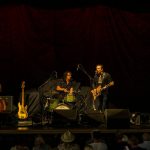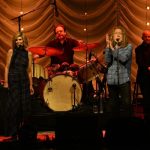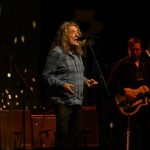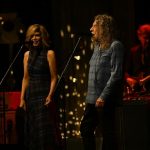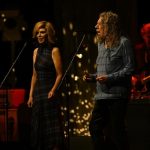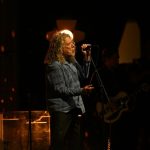Live Review: Robert Plant & Alison Krauss • Ravinia Festival • Highland Park
Robert Plant & Alison Krauss
Ravinia Festival
Highland Park, IL
Wednesday, June 12, 2024
Review by Jeff Elbel. Photos by Kyle Dunleavy/Ravinia Festival.
Wednesday’s concert at Ravinia Festival celebrated the seemingly serendipitous pairing of rock legend Robert Plant and bluegrass torchbearer Alison Krauss. While emphasizing roots music and Americana, the bandleaders’ partnership testified to the limited value of musical categories and artificial boundaries. Both artists have become recognized as wide-ranging explorers beyond their expected genres.
The set was anchored by material from 2007’s multiple-Grammy-winning album Raising Sand, and its 2021 companion Raise the Roof. The concert began as Krauss and Plant walked from opposite wings to meet at center stage for swamp-rocker “Rich Woman.” The singers’ warm two-part harmony established the evening’s key attraction, ably accompanied by JD McPherson’s slashing surf guitar, the enveloping tremolo of Stuart Duncan’s and Viktor Krauss’ guitars, and drummer Jay Bellerose’s intoxicating propulsion.
The set list was well balanced to feature both marquee artists, pushing Krauss or Plant momentarily into the foreground and then drawing them together in harmony. Plant led New Orleans R&B classic “Fortune Teller,” offering wily and expressive tweaks to the familiar melody as Krauss offered a counterpoint. Krauss’ warm voice was featured during The Everly Brothers’ “The Price of Love” while Plant stepped back to play percussion. The Everly Brothers’ song was recast as bluesy Appalachian folk, punctuated by Duncan’s tumbling banjo. During “Last Kind Word Blues,” Krauss was supported by Duncan’s resonator guitar and Viktor Krauss’ chiming electric mandolin. Dennis Crouch laid the song’s solid foundation with his double bass.
Plant again withdrew with fists full of maracas during the torch song “Trouble with My Lover,” eyes closed and grooving as Krauss’ plaintive vocal suggested that it takes a worried woman to sing a worried song.
The audience howled in approval whenever Plant reached into his upper range or bent a blues note bathed in reverb, reminiscent of classic rock triumphs including “Whole Lotta Love.” Those moments during songs like the bluesy romp through “Rock and Roll” reminded fans that they were in the presence of one of rock’s emblematic voices. Perhaps the most impressive aspects of Plant’s solid performance, however, were quieter performances as offered during Ola Belle Reed’s tragic tale “You Led Me to the Wrong.” Sung with hushed restraint, the song simmered with edge-of-the-seat intensity and displayed Plant’s seasoned control, pitch, and expression. Krauss’ violin became Plant’s wordless singing partner, wrapping mournfully around lyrics about a condemned man felled by faithlessness and revenge. Krauss also weaved sinewy lines with Duncan’s violin to a heady effect.
The band dipped into Plant’s solo career while applying a bluegrass spin to the 1983 single “In the Mood.” Between tremolo guitar licks, a lively violin duet, and Plant and Krauss’ effortless vocal harmony, the pair flashed broad smiles around the stage and at each other. Twin violins and Bellerose’s thundering tom-tom percussion underscored 17th-century murder ballad “Matty Groves,” sung afterward by Krauss.
2009 Record of the Year Grammy-winner “Please Read the Letter” took flight with Plant and Krauss’ winsome vocal blend. The duo dug into the Memphis rockabilly vibe of “Can’t Let Go” from Raise the Roof, as McPherson gave his best homage to Scotty Moore with twanging guitar leads. Plant spun joyfully onstage as Bellerose struck the song’s final beat.
A trio of reimagined Led Zeppelin favorites finished the main set, including “Gallows Pole” and “The Battle of Evermore.” Plant took a moment to celebrate the evening and praise his bandmates. “You can’t really imagine how good it feels up here,” he said. “This is one of the best times of my life as a singer and a musician.” He described his partnership with Krauss as “beauty and the beast.” “Well, she looks better now,” he joked, taking a sly jab at Krauss before counting himself lucky to be in her presence and part of her creative journey.
Krauss noted her family ties to the region. “We’re in the land of our people,” she said to cheers. “Thank God for Champaign, Illinois,” added Plant soon afterward.
The intensity onstage and off rose to a fever pitch for the dire warning of Led Zeppelin’s “When the Levee Breaks” extended as a roots-music epic. Crouch’s nimble double bass coupled with Bellerose’s grimly determined percussion while Viktor Krauss’ lush keyboard part and McPherson’s shimmering guitar made a rich musical bed for the mystical Eastern melodies of Krauss’ and Duncan’s violins. The band encored with two more chances at finely-honed harmony with the Everly Brothers’ “Stick with Me Baby” and “Gone, Gone, Gone.”
Some in the crowd may have pined for the heavy rock of Led Zeppelin or a purer country/bluegrass outing a la Union Station. Most, however, seemed to appreciate that this music was intentionally different while leaning into the artists’ personal affinities for broad swaths of American popular music. The Raise the Roof material, including “High and Lonesome,” represented a welcome return to what was expected to be a one-off experience with Raising Sand. Should the sonically restless Plant and Krauss ever decide to go for a trilogy, they can expect a receptive audience in Chicago.
- Robert Plant Alison Krause Concert
- Robert Plant Alison Krause Concert
- Robert Plant Alison Krause Concert
- Robert Plant Alison Krause Concert
- Robert Plant Alison Krause Concert
- Robert Plant Alison Krause Concert
- Robert Plant Alison Krause Concert
- Robert Plant Alison Krause Concert
- Robert Plant Alison Krause Concert
- Robert Plant Alison Krause Concert
- Robert Plant Alison Krause Concert
- Robert Plant Alison Krause Concert
- Robert Plant Alison Krause Concert
- Robert Plant Alison Krause Concert
- Robert Plant Alison Krause Concert
- Robert Plant Alison Krause Concert
- Robert Plant Alison Krause Concert
Category: Live Reviews








